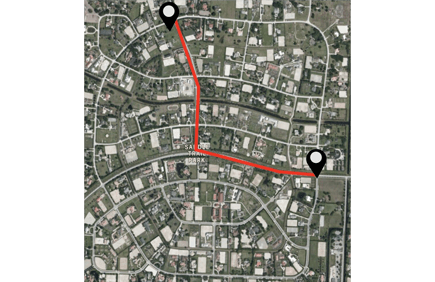Application of Machine Learning/Artificial Intelligence in Geotechnical Scheduling
August 22, 2020
Scheduling in the engineering, construction, and civil industries is challenging at times with the limited resources available, weather conditions, job constraints, government mandates, and more. Many organizations are facing the challenge of retaining skills and transferring the industry experience gained from individual projects. In response, organizations are beginning to use advanced analytics to manage project scheduling and task dispatching with the goal of improving performance, quality, and reducing cost.
An engineering project’s success depends on timely delivery with high quality which benefits from industry knowledge and previous experience. Therefore, a supervisor or project manager who places the right resources at the right time can get the job done in a timely manner. With new developments in artificial intelligence, cutting-edge algorithms can be implemented to remove project dependencies, transfer knowledge with ease, increase delivery time, and minimize expenses.
AI can be used in engineering service industries for intelligent process improvement and reactive scheduling. These algorithms can be trained to acquire the experience of a supervisor or project manager thereby increasing the performance, quality, and revenue.
Route-Based Scheduling Optimization
The first and foremost application of artificial intelligence to scheduling is the optimization of task allocation based on key parameters. Work orders can be assigned such that applicable projects within reasonable distance can be assigned to the same field engineers and technicians, taking into account various limitations beyond human comprehension. Such an algorithm minimizes time and cost associated with transporting field engineers between sites and maximizes productivity. The benefit of this application is the adaptability to remote working conditions where the algorithm factors in the distances between workers’ homes and project sites, generating schedules that reduce transport times based on where the technician resides.
Temporary Disruptions
An ideal machine learning algorithm must adapt to changing conditions to be beneficial in the industrial context. One such condition is field engineers calling in sick or otherwise being unable to perform daily tasks. The algorithm will be able to re-assign work orders to minimize negative effects and keep projects on schedule, helping the firm increase profit margins. Another major condition to work around is bad weather. The machine learning framework will monitor weather forecasts at project sites to decide when and how to assign work orders, minimizing costs of rain days and allocating resources to better sites.
Permanent Disruptions
Over time, the set of resources a firm utilizes, such as equipment and workers, may evolve. Artificial intelligence will be able to handle such disruptions and re-evaluate the situation. For example, when a worker leaves in the middle of a project, the algorithm can update future work orders to accommodate the change. This logic applies to new workers and equipment malfunctions as well. The automatic re-evaluation of resources helps the algorithm better optimize scheduling for the firm, saving costs and increasing profit.
Predictive Analytics
Perhaps the most insightful and human-like quality of a ML/AI application to scheduling is the ability to schedule field engineers based on skills, previous performance, and timeliness. Managers will have the ability to rate the performance of workers and evaluate their skill level. These ratings, along with the timeliness of the worker, will factor into their placement in future schedules. For example, in critical projects, a manager can choose the best engineer out of a pool of candidates based solely on the algorithm’s analytics feature, helping the firm make better and more reliable business decisions.
Automated Scheduling System
We at eFieldData are heading in this direction. We have spent time understanding the needs of companies in the industry, and developed a product that is aimed at optimizing efficiency through innovation. Already, eFieldData can automatically schedule and dispatch work orders, and eFieldData’s paperless and user-friendly automated format can be tailor-made to fit a company’s distinct requirements, while still adhering to industry requirements. More and more companies each year are moving towards automated reports in an industry that is more digital than ever. eFieldData is a customized solution to help companies reach their full potential, and keep up with the times.
Contact us to learn more about eFieldData.



